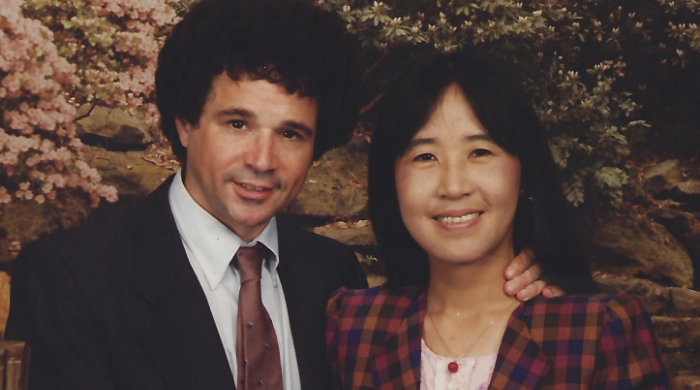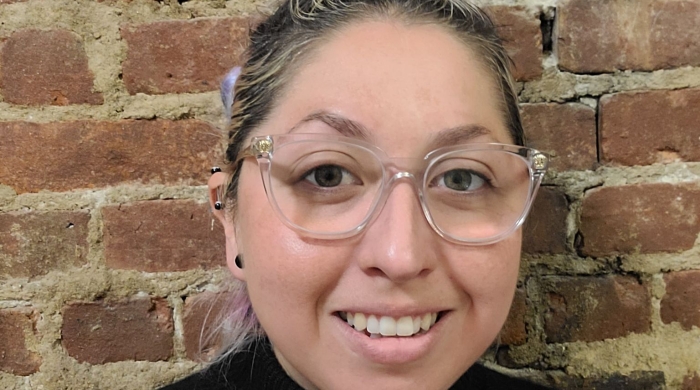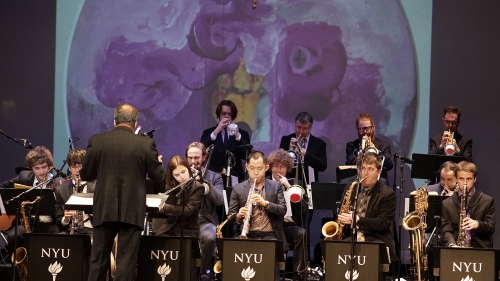When it came time for Tristan Argenti (BA ’59, MA ’60) to consider his estate plans, he knew that he wanted to support NYU.
A long-time fan of jazz music, Argenti contacted the University to determine how that support could be tailored to his interests and was quickly introduced to Director of Jazz Studies David Schroeder. After learning about the program and Schroeder’s plans for its future, Argenti made the decision to support NYU Steinhardt and Jazz Studies through his estate.
Argenti’s bequest will offer transformational scholarship support to ensure the Jazz Studies program can recruit and retain the most talented students. “The Tristan Argenti Scholarship in Jazz Studies will give exceptional students the opportunity to perform and study with world-renowned jazz artists and faculty in some of New York City’s leading venues,” says Jack H. Knott, Gale and Ira Drukier Dean. “We are deeply grateful to Tristan for his commitment to ensuring a strong future for jazz students and the modern jazz industry.”
Argenti shared, “I audited a couple of Dave Schroeder’s classes and was impressed by the degree of interest in the music many of his students manifested. In talking with some of them, they expressed their gratitude for my coming to see them. One wanted to know details of the sidemen who were playing with John Coltrane one particular night that I had mentioned to the class. That gave me hope for the future, that the uniquely American music of jazz would live on as a viable cultural phenomenon, for it, and bebop in particular, are the truth.”
In the special feature below, Schroeder shares Argenti’s story and how they connected over their shared love of jazz: “Connecting with alumni can take root in unforeseen ways. We faculty members often focus our time and efforts on current students and the community we work with daily at the Square. I was thrilled to connect with alum Tristan Argenti, who sought me out through his affection for NYU and his deep passion for jazz music.”
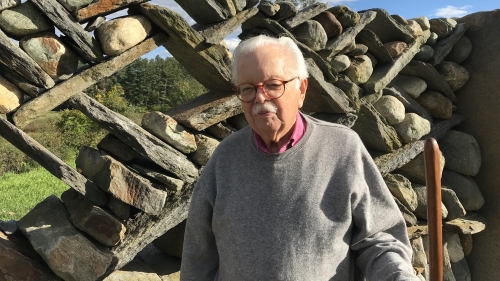
Tristan Argenti (Washington Square College ’59, GSAS ’60) came into the world in New York City in 1932. His father, John P. Argenti, who was born in London, England in 1884 to a family of Greek origin, moved to America in 1926 to eventually start a successful wine import business, having worked before in India for 15 years for the British company Ralli Brothers, a large import-export concern specializing in jute, shellac, grain, turmeric, ginger, rice, saltpeter and borax.
Argenti attended St. Bernard’s School on 98th Street, a British-run school at the time. He then transferred to a boarding school in Massachusetts, St. Mark’s, before discovering that he suffered from dyslexia and transferring to the Gow School in South Wales, New York. Gow was the first school in America to acknowledge the problem of dyslexia, and its approach offered positive results for Argenti.
Growing up in New York, Argenti had few interests outside of reading books and a passing interest in swing music, the big bands, and boogie-woogie. At age 15, Argenti discovered the existence of the musical genius Charlie “Bird” Parker and as he told Schroeder, “Bird just blew my mind. The whole bebop concept was thrilling to me.”
The mecca for modern jazz was on 52nd Street. Unfortunately, Argenti was too young to get into the clubs and was still away at school in South Wales.
The Tristan Argenti Scholarship in Jazz Studies will give exceptional students the opportunity to perform and study with world-renowned jazz artists and faculty in some of New York City’s leading venues. We are deeply grateful to Tristan for his commitment to ensuring a strong future for jazz students and the modern jazz industry.
Argenti said, “Most of the other guys at the Gow School were almost exclusively interested in Dixieland, music that I really didn’t like. Musically, the contrast I found was enormous, between their cacophonous Dixieland stuff and the beauty and complexity of the bop movement that would affect the rest of my life.”
Argenti’s love for bebop inspired him to frequent jazz clubs across the City, and even led to some brushes with fame: “I saw Charlie Parker play live at the Downbeat Club on West 54th Street and I actually talked to Miles Davis one night at that club. He was standing next to me at the bar and I asked him what song the band on stage was playing. He slowly turned his head to me and said nothing for about five seconds, then he told me the number’s title. That was the extent of our conversation; otherwise, I didn’t really speak with any other jazz greats with the exception of Jutta Hipp, who was introduced to me at the Hickory House, a New York jazz venue; she was a recently arrived German pianist who found a following in the 50s. From there, I developed an affinity for jazz trumpet players and heard the great Chet Baker play on several occasions while living in Paris in the 70s. That was quite an experience because he was playing in a grotto near the Seine on the Left Bank. This atmospheric cellar with Chet and his band playing created a wonderful atmosphere.”
In 1951, Argenti spent a year at the University of Pennsylvania. The following year, he was drafted into the Army and served a year and a half on the front lines during the Korean War. After his discharge, he began his studies at NYU in the fall of 1955, pursuing an English degree at Washington Square College, now the College of Arts and Science and an MA at the Graduate School of Arts and Sciences in the same subject. After completing his studies at NYU, he got married and raised a family, eventually moving to Paris in 1967 with his wife and children, then three years and nine months. Argenti’s mother was Parisian, and although she died in 1960, her entire family was still living there and welcomed Argenti and his family with open arms.
In 1979, Argenti moved his family back to the States and settled in Sarasota, Florida where his interest in jazz piqued again. As he shared, “I’ve always had a passion for jazz and when I began listening to a weekly jazz program from a public radio station in Tampa hosted by Vic Hall, I got involved with the Tampa Jazz Club that presented regular jazz concerts by prominent musicians.” Hall would also introduce him to the International Association of Jazz Record Collectors (IAJRC).
“By 1993 I began attending all the IAJRC conventions and would eventually join their board of directors,” said Argenti. Around 2005, Argenti became interested in education again, and cited NYU as his favorite educational institution. “I called up David Koehler from the Development Office and said I’d be willing to make a gift to NYU. I thought it might be a nice idea if I could leave a scholarship to the Jazz Studies program. He said, ‘Great idea,’ and that’s how I met Lawrence Ferrara, the then-Chair of Steinhardt’s Department of Music and Performing Arts Profession (MPAP). It was Ferrara who introduced me to Dave Schroeder, the Director of Jazz Studies.”
Schroeder shared, “Tristan and I have known each other for years by now and have become great friends and confidants. Our relationship has become somewhat symbiotic in that Tristan has gotten me to hone my skills as a writer by inviting me to write several articles for the IAJRC Journal over the years, and in the end giving me much-needed publication support for my academic promotions. The IAJRC published my articles on such notable jazz artists as Cedar Walton, Steve Kuhn, Teo Macero, Helen Keane, Joe Lovano, and Herb Alpert. Tristan truly helped me become a better writer, preparing me to publish my first book, entitled From the Minds of Jazz Musicians, inspired by 'The NYU Jazz Interview Series' that I produce and host on YouTube.”
Argenti echoed, “Dave and I became fast friends. Every time I come to New York for Alumni Weekend, I always look him up and we share a lovely dinner together. He has encouraged me to keep listening to music as he’s certainly taught me to keep the faith in a time when jazz music is always on the move.”
Schroeder said, “I can’t tell you how honored I am to know Tristan and to have him associated with Steinhardt Jazz Studies. He truly feels like a family member to me to the point where I often play practical jokes on him. For instance, a few years ago, I’d asked Tristan to visit my jazz history class that was filled with my young undergrad students. We had just finished discussing hot jazz music from the 1920s and listening to a bandleader named Eddie Condon. When Tristan arrived, I announced that we had a very special guest with us today – ‘Please welcome the great Eddie Condon!’ The students began wildly applauding, believing that the 100 year old Condon was actually in the room, while Tristan and I burst out laughing.”
Learn more about creating your legacy with a gift of any size to NYU Steinhardt.
Related Articles
Generous Gift from Okhee Lee Supports STEM Education with Equity and Justice
Lee’s donation will fund a scholarship and an annual symposium for the field.
Maxie Ezratti (BS ’10) Endows Generous Early Childhood Ed Scholarship
The gift marks the first endowed scholarship in the program's history.
Department of Communicative Sciences and Disorders Announces Inaugural Carol Hall Majzlin Award Winner
Cyn Perez (’23) has received the 2022 fellowship for Practicum III students.
Related Programs
Related Department
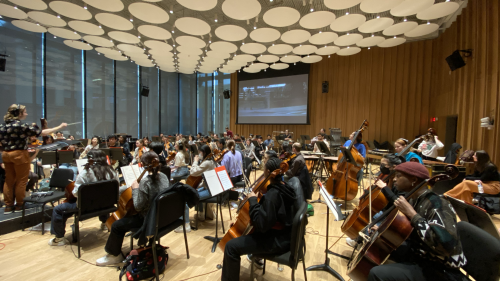
Music and Performing Arts Professions
35 W. 4th Street, 2nd Floor
New York, NY 10012
212-998-5424
mpap@nyu.edu

